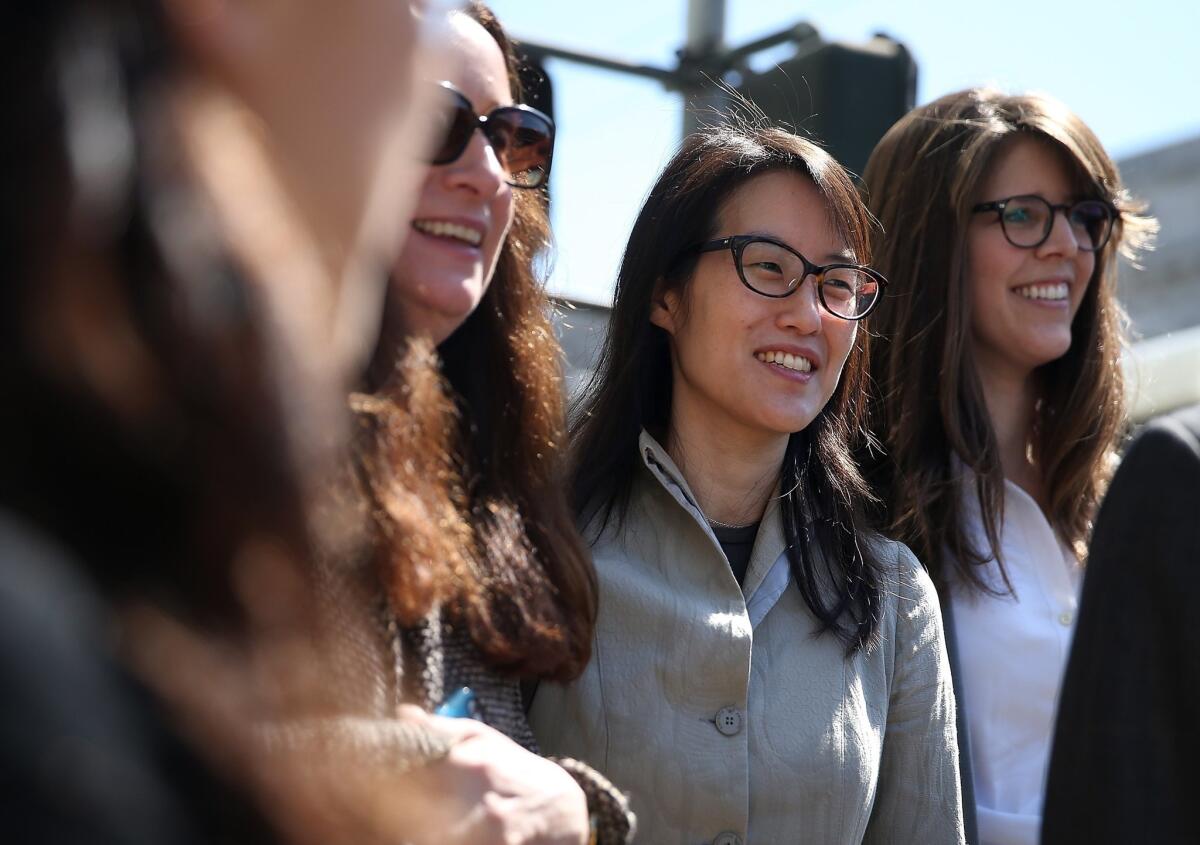Editorial: Ellen Pao trial highlights gender gap in venture capital

- Share via
“The number of women in venture capital is pathetic.”
That assessment comes from John Doerr, the senior partner at Kleiner Perkins Caufield & Byers who helped fund such tech start-ups as Netscape, Amazon, Google and Uber. The statistics bear him out: There are more than 15 men for every woman in venture capital, which provides crucial funding for entrepreneurs and innovators. And though there are plenty of explanations for how that disparity came about, it’s harder to find a way to close the gap.
Doerr made his observation from the witness stand at San Francisco County Superior Court, where a jury heard former Kleiner Perkins junior partner Ellen Pao’s gender discrimination lawsuit against the firm. The case riveted the tech industry for much of the month, thanks to its sometimes salacious revelations about Kleiner Perkins’ bro-tastic culture. (One sample: A married partner gave Pao a book of poetry laced with erotic verses and illustrations for Valentine’s Day. He said his wife picked it out.) On Friday, the jury rejected all of Pao’s claims, saving the firm’s bank account, if not its reputation.
As embarrassing as the disclosures were for Kleiner Perkins, the case has been worse for the venture capital industry and the tech world in general, because it trained a spotlight on the entrenched imbalances in hiring and leadership. The gender gap at venture firms not only parallels the situation at tech companies around the United States, but it appears to encourage the larger problem for women in tech. There’s a feedback loop that works against women: Male-dominated venture capital firms invest disproportionately in businesses led by men, while drawing their talent from the top ranks of start-ups. Meanwhile, entrepreneurs looking for capital gravitate toward venture firms with partners who’ve run companies.
The lack of diversity in venture firms can blind them to opportunities outside their blinkered cultures. Just look at the Hollywood studios, which produced few shows built around minority characters and actors until the breakout success of “Scandal” proved that there was a market for such fare. To try to tap those opportunities, more women are forming their own venture funds, such as Kirsten Green’s Forerunner Ventures. And other new firms are emerging that trumpet their partners’ diversity, such as .406 Ventures where three of the seven top executives are women.
Yet as long as venture firms search for partners within the confines of the tech world and Wall Street, the diversity problems will linger like a stubborn stain. Fewer than 20% of the computer science and engineering graduates in the country are female, and nearly 40% of the women with engineering degrees either drop out of the field after graduation or never enter it. Ironically, Kleiner Perkins is seen as a leader among tech venture firms when it comes to hiring women; 20% of its partners are female. But despite the firm’s victory in Pao’s lawsuit, the testimony about it may persuade more women to steer clear of the venture capital fraternity. Here’s hoping that the episode will push venture firms and the tech industry to work harder on their diversity problem, the verdict notwithstanding.
Follow the Opinion section on Twitter @latimesopinion and Facebook
More to Read
A cure for the common opinion
Get thought-provoking perspectives with our weekly newsletter.
You may occasionally receive promotional content from the Los Angeles Times.





